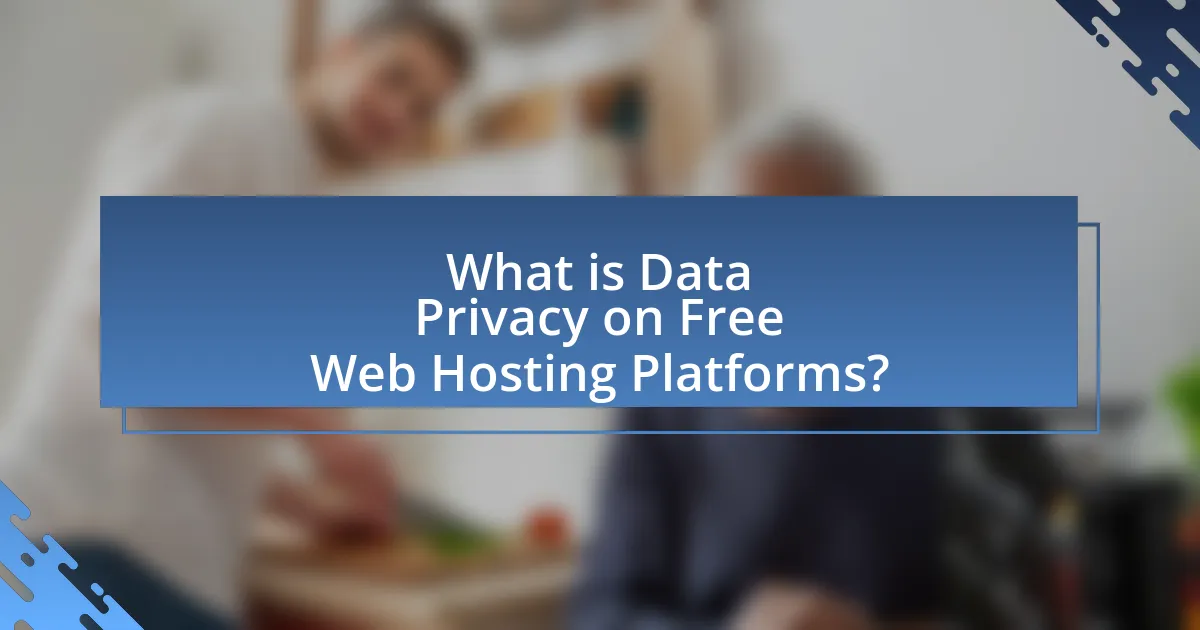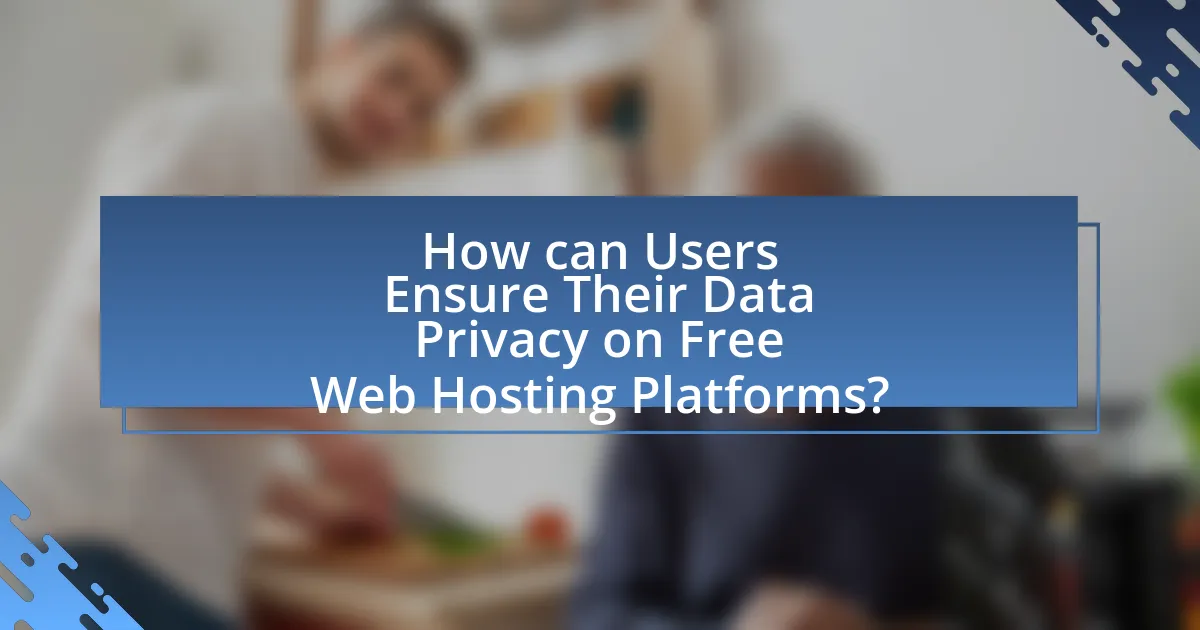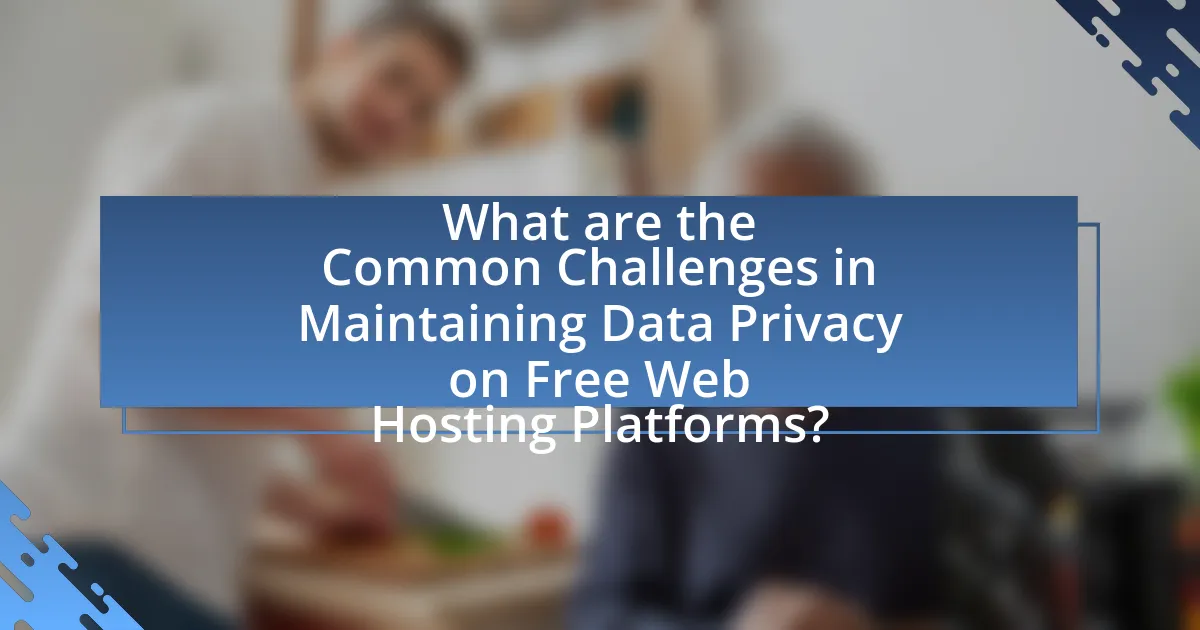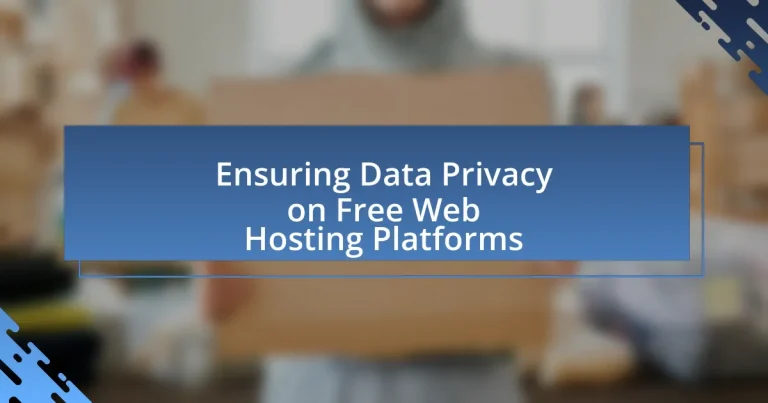Data privacy on free web hosting platforms is a critical concern due to the potential risks associated with inadequate security measures and data monetization practices. Users often unknowingly expose sensitive information, which can lead to data breaches, identity theft, and loss of trust. Key components of data privacy include encryption, user consent, and compliance with regulations, while common challenges involve limited security and vague privacy policies. To mitigate risks, users should implement strong passwords, enable two-factor authentication, and regularly audit their data privacy measures, ensuring they understand how their information is collected and used by these platforms.

What is Data Privacy on Free Web Hosting Platforms?
Data privacy on free web hosting platforms refers to the protection of personal and sensitive information stored and processed on these services. Free web hosting platforms often monetize their services through advertising or data collection, which can lead to inadequate security measures and potential data breaches. According to a study by the Electronic Frontier Foundation, many free hosting services may not implement robust encryption or data protection protocols, increasing the risk of unauthorized access to user data. Therefore, users must be aware of the privacy policies and security practices of these platforms to safeguard their information effectively.
Why is Data Privacy Important for Users of Free Web Hosting Platforms?
Data privacy is crucial for users of free web hosting platforms because these services often monetize user data, potentially exposing sensitive information. Users may unknowingly share personal data, which can be sold to third parties or used for targeted advertising, leading to privacy breaches. According to a 2021 study by the Electronic Frontier Foundation, many free hosting services do not implement robust security measures, increasing the risk of data leaks and unauthorized access. Therefore, understanding data privacy is essential for users to protect their personal information and maintain control over their online presence.
What are the potential risks associated with inadequate data privacy?
Inadequate data privacy poses significant risks, including data breaches, identity theft, and loss of customer trust. Data breaches can lead to unauthorized access to sensitive information, affecting millions of users; for instance, the 2017 Equifax breach exposed personal data of approximately 147 million people. Identity theft can result from compromised personal information, leading to financial loss and legal issues for victims. Furthermore, businesses that fail to protect user data may experience a decline in customer trust, which can impact their reputation and revenue, as studies show that 81% of consumers are concerned about data privacy.
How can data breaches impact users and their information?
Data breaches can severely impact users by exposing their personal information, leading to identity theft, financial loss, and privacy violations. When a data breach occurs, sensitive data such as names, addresses, social security numbers, and financial information can be accessed by unauthorized individuals. According to the Identity Theft Resource Center, in 2021, there were over 1,800 data breaches reported, affecting millions of individuals and resulting in significant financial repercussions for victims. Additionally, the Ponemon Institute’s 2022 Cost of a Data Breach Report indicated that the average cost of a data breach for organizations was $4.35 million, which can indirectly affect users through increased costs for services and reduced trust in platforms. Thus, data breaches not only compromise user information but also have broader implications for user safety and financial security.
What are the key components of Data Privacy in Free Web Hosting?
The key components of data privacy in free web hosting include data encryption, user consent, data access controls, and compliance with privacy regulations. Data encryption protects sensitive information from unauthorized access during transmission and storage. User consent ensures that individuals are informed about how their data will be used and shared, which is essential for legal compliance. Data access controls limit who can view or manipulate user data, thereby reducing the risk of breaches. Compliance with privacy regulations, such as GDPR or CCPA, mandates that hosting providers adhere to specific standards for data protection, ensuring that users’ rights are respected and upheld.
What types of data are typically collected by free web hosting platforms?
Free web hosting platforms typically collect user data such as email addresses, IP addresses, website usage statistics, and personal information provided during account registration. This data collection is often necessary for account management, service improvement, and targeted advertising. For instance, according to a study by the Electronic Frontier Foundation, many free hosting services track user behavior to enhance their offerings and monetize their platforms through ads.
How do free web hosting platforms manage user data?
Free web hosting platforms manage user data primarily through data collection, storage, and processing practices that often involve limited privacy protections. These platforms typically collect user information such as email addresses, website content, and usage statistics to provide services and improve user experience. However, many free hosting services monetize user data through advertising or selling aggregated data to third parties, which raises privacy concerns.
For instance, a study by the Electronic Frontier Foundation highlights that many free hosting services do not implement robust encryption or data protection measures, making user data vulnerable to breaches. Additionally, terms of service agreements often allow these platforms to retain user data even after account deletion, further complicating data privacy.

How can Users Ensure Their Data Privacy on Free Web Hosting Platforms?
Users can ensure their data privacy on free web hosting platforms by carefully reviewing the platform’s privacy policy and terms of service. This review allows users to understand how their data will be collected, used, and shared. Additionally, users should utilize strong passwords and enable two-factor authentication to enhance account security. According to a 2021 study by the Ponemon Institute, 63% of data breaches are due to weak passwords, highlighting the importance of robust security measures. Furthermore, users should avoid sharing sensitive information and consider using encryption tools for any data stored on these platforms.
What steps can users take to protect their data?
Users can protect their data by implementing strong passwords, enabling two-factor authentication, and regularly updating software. Strong passwords, which include a mix of letters, numbers, and symbols, significantly reduce the risk of unauthorized access; studies show that 81% of data breaches are linked to weak passwords. Two-factor authentication adds an additional layer of security, making it harder for attackers to gain access even if they have the password. Regular software updates patch vulnerabilities that could be exploited by cybercriminals, as outdated software is a common entry point for attacks.
How can users evaluate the privacy policies of free web hosting services?
Users can evaluate the privacy policies of free web hosting services by carefully reviewing the terms and conditions outlined in the policy documents. This includes checking for details on data collection practices, data sharing with third parties, user consent requirements, and the measures taken to protect user data.
For instance, a comprehensive privacy policy should explicitly state what types of personal information are collected, how that information is used, and whether it is sold or shared with advertisers. Additionally, users should look for information on data retention periods and the rights they have regarding their data, such as the ability to access, modify, or delete their information.
Research indicates that 79% of internet users are concerned about how their data is being used by companies, highlighting the importance of transparency in privacy policies. Therefore, users should prioritize services that provide clear, concise, and accessible privacy policies to ensure their data privacy is adequately protected.
What security measures should users implement on their websites?
Users should implement HTTPS, strong passwords, regular software updates, and security plugins on their websites. HTTPS encrypts data transmitted between the user and the website, protecting sensitive information from interception. Strong passwords, ideally using a combination of letters, numbers, and symbols, help prevent unauthorized access; studies show that 81% of data breaches are due to weak passwords. Regular software updates ensure that vulnerabilities are patched, reducing the risk of exploitation. Security plugins can provide additional layers of protection, such as firewalls and malware scanning, which are essential for maintaining website integrity.
What tools and resources are available for enhancing data privacy?
Tools and resources available for enhancing data privacy include encryption software, privacy-focused web browsers, and secure communication platforms. Encryption software, such as VeraCrypt and BitLocker, protects data by converting it into a secure format that can only be accessed with a decryption key. Privacy-focused web browsers like Tor and Brave help users maintain anonymity online by blocking trackers and encrypting internet traffic. Secure communication platforms, such as Signal and ProtonMail, offer end-to-end encryption for messages and emails, ensuring that only the intended recipients can read the content. These tools collectively contribute to a more secure online environment, particularly important for users on free web hosting platforms where data privacy risks may be heightened.
Which encryption methods can users apply to safeguard their data?
Users can apply several encryption methods to safeguard their data, including AES (Advanced Encryption Standard), RSA (Rivest-Shamir-Adleman), and TLS (Transport Layer Security). AES is widely used for encrypting data at rest and is recognized for its efficiency and security, operating on block sizes of 128, 192, or 256 bits. RSA is commonly utilized for secure data transmission, employing asymmetric encryption to protect sensitive information during transfer. TLS, which secures communications over a computer network, is essential for protecting data in transit, ensuring that information exchanged between users and web servers remains confidential. These methods are validated by their widespread adoption in various industries, demonstrating their effectiveness in maintaining data privacy.
How can users utilize privacy-focused plugins or services?
Users can utilize privacy-focused plugins or services by installing them on their web browsers or websites to enhance data protection. These tools, such as ad blockers, VPNs, and encryption services, help prevent tracking, secure communications, and limit data exposure. For instance, using a VPN can encrypt internet traffic, making it difficult for third parties to monitor online activities. Additionally, plugins like HTTPS Everywhere ensure secure connections to websites, while privacy-oriented search engines minimize data collection. The effectiveness of these tools is supported by studies showing that VPNs can significantly reduce the risk of data breaches and tracking, thereby reinforcing user privacy on free web hosting platforms.

What are the Common Challenges in Maintaining Data Privacy on Free Web Hosting Platforms?
Common challenges in maintaining data privacy on free web hosting platforms include limited security measures, lack of encryption, and data ownership issues. Free web hosting services often do not invest in robust security protocols, making user data vulnerable to breaches. Additionally, many platforms do not provide encryption for data in transit or at rest, exposing sensitive information to unauthorized access. Furthermore, users may unknowingly relinquish ownership of their data, as terms of service often grant the hosting provider rights to use or sell user data. These factors collectively compromise the integrity and confidentiality of user information on such platforms.
What limitations do free web hosting platforms impose on data privacy?
Free web hosting platforms impose significant limitations on data privacy by often lacking robust security measures and user control over data. These platforms typically monetize their services through advertising and data collection, which can lead to user data being shared with third parties without explicit consent. Additionally, many free hosting services do not provide encryption for data in transit or at rest, making it vulnerable to unauthorized access. According to a study by the Electronic Frontier Foundation, free hosting services frequently have vague privacy policies that do not clearly outline how user data is handled, further compromising user privacy.
How do advertisements and third-party integrations affect user data?
Advertisements and third-party integrations significantly impact user data by collecting, analyzing, and sharing personal information for targeted marketing. Advertisements often utilize tracking technologies, such as cookies and pixels, to monitor user behavior across websites, leading to the accumulation of detailed profiles based on browsing habits. Third-party integrations, like social media plugins or analytics tools, further enhance this data collection by accessing user information from various platforms, which can include email addresses, location data, and demographic details. According to a study by the Electronic Frontier Foundation, over 70% of websites employ third-party trackers, which can compromise user privacy by enabling data sharing without explicit consent. This interconnected data ecosystem raises concerns about user privacy, especially on free web hosting platforms where monetization often relies on advertising revenue.
What are the implications of shared hosting environments on data security?
Shared hosting environments significantly increase the risk of data security breaches due to multiple users sharing the same server resources. This configuration can lead to vulnerabilities such as cross-site scripting, where one user’s malicious code can affect others, and unauthorized access to sensitive data if proper isolation measures are not implemented. According to a study by the Ponemon Institute, 60% of organizations using shared hosting reported data breaches linked to inadequate security measures. Additionally, the lack of dedicated resources means that security updates and patches may not be applied promptly, further exposing data to potential threats.
How can users navigate these challenges effectively?
Users can navigate the challenges of ensuring data privacy on free web hosting platforms by implementing strong security measures and being vigilant about their data management practices. This includes using encryption for sensitive data, regularly updating software to patch vulnerabilities, and employing strong, unique passwords for accounts. Research indicates that 60% of data breaches occur due to weak passwords, highlighting the importance of robust password management. Additionally, users should read the privacy policies of hosting providers to understand how their data will be used and shared, ensuring they choose platforms that prioritize user privacy.
What best practices should users follow to mitigate risks?
Users should follow several best practices to mitigate risks associated with data privacy on free web hosting platforms. First, they should use strong, unique passwords for their accounts to prevent unauthorized access; studies show that 81% of data breaches are due to weak or stolen passwords. Second, enabling two-factor authentication adds an extra layer of security, significantly reducing the likelihood of account compromise. Third, users should regularly update their software and plugins to protect against vulnerabilities; according to the Cybersecurity & Infrastructure Security Agency, outdated software is a common entry point for cyberattacks. Fourth, users must be cautious about the information they share publicly, as oversharing can lead to identity theft or phishing attacks. Lastly, backing up data regularly ensures that users can recover their information in case of a breach or data loss, with 30% of businesses reporting data loss due to cyber incidents. By implementing these practices, users can effectively reduce their risk exposure on free web hosting platforms.
How can users stay informed about data privacy trends and updates?
Users can stay informed about data privacy trends and updates by subscribing to reputable data privacy newsletters and following authoritative organizations in the field. For instance, organizations like the Electronic Frontier Foundation (EFF) and the International Association of Privacy Professionals (IAPP) regularly publish insights and updates on data privacy issues. Additionally, attending webinars and conferences focused on data privacy can provide users with the latest information and networking opportunities with experts. Research indicates that staying engaged with these resources significantly enhances users’ understanding of evolving data privacy regulations and best practices.
What are the best practices for ensuring data privacy on free web hosting platforms?
To ensure data privacy on free web hosting platforms, users should implement strong encryption methods for data transmission and storage. Utilizing HTTPS for secure communication protects data from interception during transfer. Additionally, regularly updating software and plugins minimizes vulnerabilities that could be exploited by attackers. Users should also read and understand the privacy policies of the hosting provider to know how their data is handled. Furthermore, employing strong, unique passwords and enabling two-factor authentication adds an extra layer of security. According to a study by the Ponemon Institute, 60% of data breaches are linked to weak passwords, highlighting the importance of robust password practices.
How can users regularly audit their data privacy measures?
Users can regularly audit their data privacy measures by implementing a systematic review process that includes checking privacy settings, reviewing data sharing permissions, and assessing compliance with privacy policies. This process involves regularly updating software and applications to ensure they have the latest security features, as outdated systems can expose users to vulnerabilities. Additionally, users should conduct periodic assessments of the data they collect and store, ensuring that only necessary information is retained and that it is securely managed. Regularly reviewing third-party services for their data handling practices is also crucial, as these services can impact overall data privacy. According to a study by the International Association of Privacy Professionals, organizations that conduct regular audits are 50% more likely to identify and mitigate privacy risks effectively.
What resources can users consult for ongoing data privacy education?
Users can consult various resources for ongoing data privacy education, including government websites, nonprofit organizations, and online courses. Government websites like the Federal Trade Commission (FTC) provide guidelines and updates on data privacy laws and best practices. Nonprofit organizations such as the Electronic Frontier Foundation (EFF) offer articles, toolkits, and webinars focused on digital privacy. Additionally, platforms like Coursera and edX offer online courses on data privacy and cybersecurity, enabling users to learn at their own pace. These resources are credible and regularly updated, ensuring users stay informed about the evolving landscape of data privacy.


